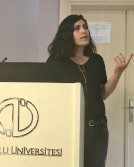
Seda Esersin
Visiting Scholar
School of Education
Email: [email protected]
phone: (949) 824-5118
office: Education 3200
Visiting Scholar
School of Education
Email: [email protected]
phone: (949) 824-5118
office: Education 3200
Biography
Seda Esersin is a Ph.D. student in the Department of Language and Speech Therapy at Anadolu University in Turkey. She spent the summer as a visiting scholar at UCI, working with Dr. Elizabeth Peña in the HABLA (Human Abilities in Bilingual Language Acquisition) Lab.
Seda specializes in bilingual/multilingual language acquisition, and the role of cognition in language development. Her Ph.D. dissertation explores the narrative language abilities of Turkish-Kurdish bilinguals. An aim of the study is to empirically validate a language assessment instrument in Kurdish, such that the Turkish-Kurdish bilinguals living in Turkey have access to timely and accurate language diagnostic measures.
A strong believer in valid assessment for language minority children, and a speech-language pathologist herself, Seda is committed to continuing this line of work until all Turkish-Kurdish bilinguals have access to the same assessment and intervention practices that their monolingual peers do. Apart from her research, Seda has enjoyed cooking Turkish dishes for her new California friends.
Seda Esersin is a Ph.D. student in the Department of Language and Speech Therapy at Anadolu University in Turkey. She spent the summer as a visiting scholar at UCI, working with Dr. Elizabeth Peña in the HABLA (Human Abilities in Bilingual Language Acquisition) Lab.
Seda specializes in bilingual/multilingual language acquisition, and the role of cognition in language development. Her Ph.D. dissertation explores the narrative language abilities of Turkish-Kurdish bilinguals. An aim of the study is to empirically validate a language assessment instrument in Kurdish, such that the Turkish-Kurdish bilinguals living in Turkey have access to timely and accurate language diagnostic measures.
A strong believer in valid assessment for language minority children, and a speech-language pathologist herself, Seda is committed to continuing this line of work until all Turkish-Kurdish bilinguals have access to the same assessment and intervention practices that their monolingual peers do. Apart from her research, Seda has enjoyed cooking Turkish dishes for her new California friends.

